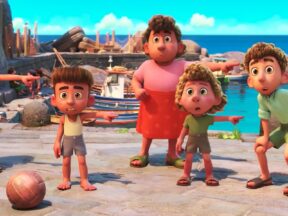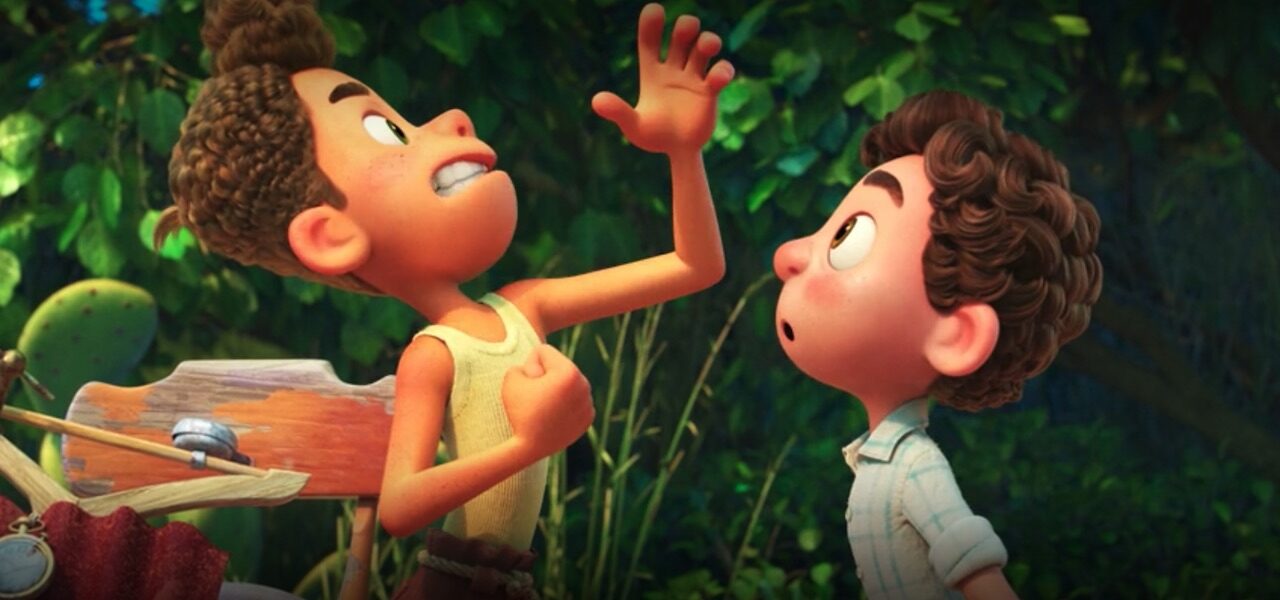

‘Luca’ Review: Easily The Best Pixar Movie Since ‘Coco’
Sea monsters lurk in the waters of Portorosso, the fictional Italian village in Enrico Casarosa’s radiant ode to young friendship, Luca. But they are friendly, and just as terrified of the “land monsters,” or humans, as the townspeople are of them. There’s no destructive magical force or larger-than-life antagonist in sight, just two scaled boys from underwater growing up together as they discover a foreign place above the surface.
Although some might erroneously dismiss it as a work of lesser ambition because it doesn’t tackle the afterlife, the origin of human emotions, or any other grand existentialist queries, Luca is easily the best Pixar movie since 2017’s Coco. Immediately relatable and far less abstract than Pete Docter’s Soul, the last feature from the Emeryville studio, Luca is concerned with the foundational relationships that give us confidence, that develop our interests, that influence how we mold our vision of ourselves.
In narrative scope, Casarosa’s debut is closer to Hayao Miyazaki’s Ponyo than to Soul. Co-writers Jesse Andrews and Mike Jones have tapped into a well of precious idiosyncrasies for one of the most precise depictions of boyhood in any animated feature of late. Aesthetically, it resembles the charming plasticity of an Aardman production by way of Casarosa’s own Oscar-nominated Pixar short La Luna. The protagonist here strongly echoes that film’s Bambino.
Blue-haired Luca (Jacob Tremblay), a young sea monster, lives in the subaquatic equivalent of a pastoral town, where the sheep are adorable, unruly fish (keep an eye out for Giuseppe and Mona Lisa). But not unlike Ariel in The Little Mermaid, when Luca comes across objects that belonged to the mysterious beings living past the shore, he finds he wants to be part of that world. Against the advice of his parents (Maya Rudolph and Jim Gaffigan), he joins daredevil Alberto (Jack Dylan Grazer) and leaves the safety of the deep.
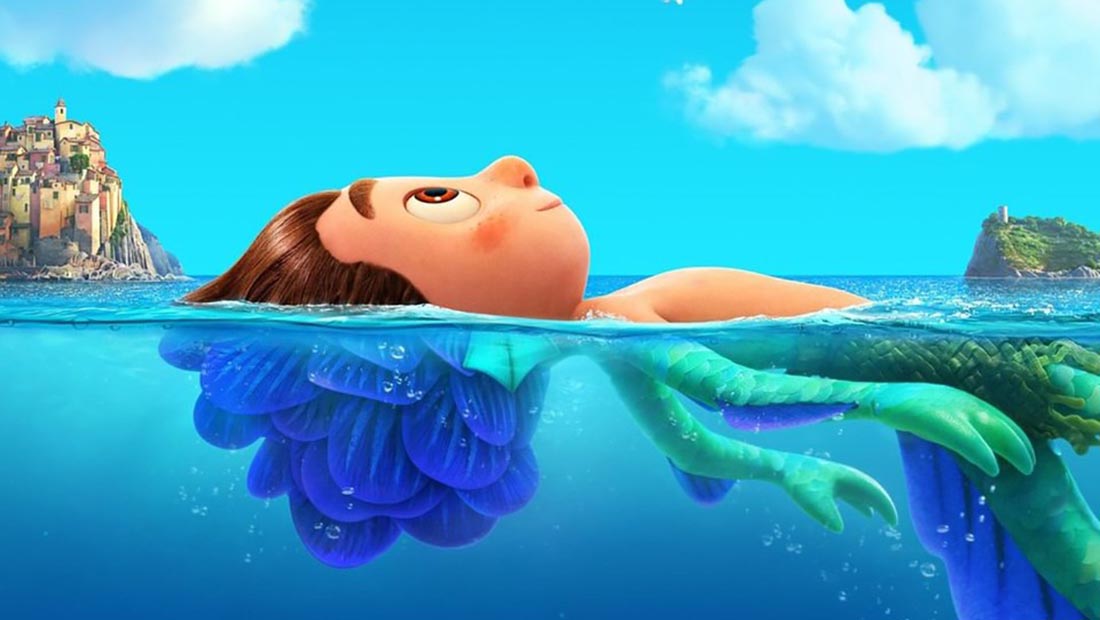
Both kids transform into humans the second their bodies dry. Touching water, however, exposes their real selves (think the manga-anime franchise Ranma 1/2). No explanations are given for the mechanics of their duality, but they‘re not particularly necessary.
The film wondrously creates two versions of several characters, as humans and mythical creatures, while retaining their facial essence in both. Concept art indicates the influence of Japanese manga and anime, specifically Studio Ghibli, which can also be appreciated in the drawings depicting the aftermath of the tale that play alongside the credits. (The village’s name is another nod to Ghibli.)
The high caliber of the character design and animation are apparent in details like the way Alberto’s mouth moves, which signals his valiant, nonchalant personality; how scales retract from bodies; or when characters appear mid-transition (part skin and part scales). Credit goes both to Casarosa and production designer Daniela Strijleva, whose team also created the rustic, timeless look of the Mediterranean setting, with stone roads and buildings that have seen the passage of time.
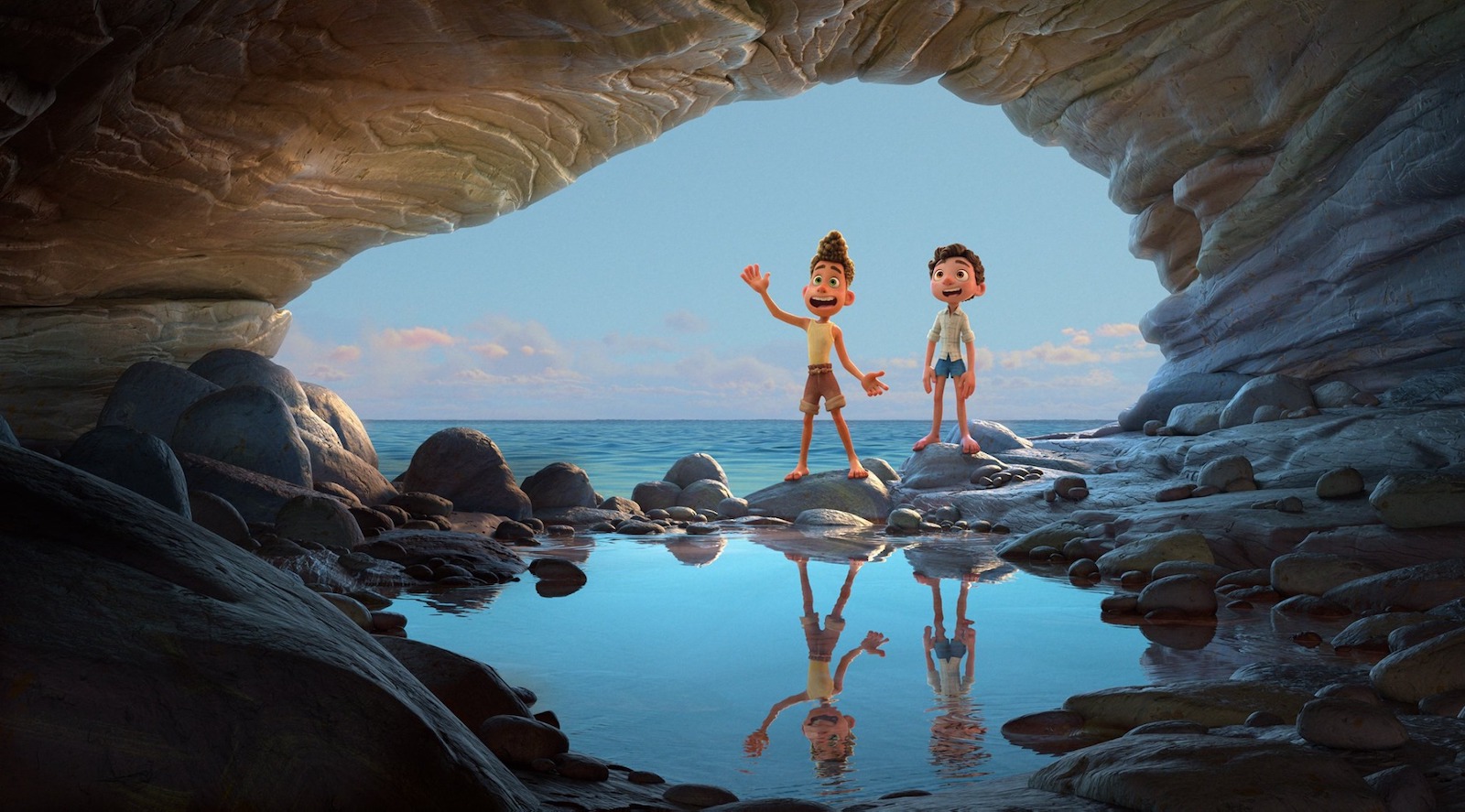
Luca and Alberto bond through sun-drenched adventures and joint efforts to build a makeshift Vespa scooter. Yet broader horizons, they think, are further inland. Scenes at twilight shine with a summer haze of warm light that rivals magic-hour shots in live-action films. That dreamlike quality reflects Luca and Alberto’s carefree attitude, evident in the way they scream “Silenzio Bruno” before any risky undertaking, thus silencing their inner voice of doubt. “Bruno” is simply their name for apprehension.
Arriving in Portorosso, they learn the townspeople hate mermaid-like beings like them, but they also meet spunky Giulia (Emma Berman), a girl invested in winning the annual triathlon-style race (though this one fittingly involves eating pasta). She wants the bragging rights of defeating the local bully, and the boys want the prize funds to purchase a real vehicle. A team of underdogs emerges. There’s also Giulia’s dad Massimo (Marco Barricelli), born with one arm but not for that any less of a skilled fisherman; he seems nearly identical to Papà in La Luna. Their judgmental cat Machiavelli is responsible for some great comedy.
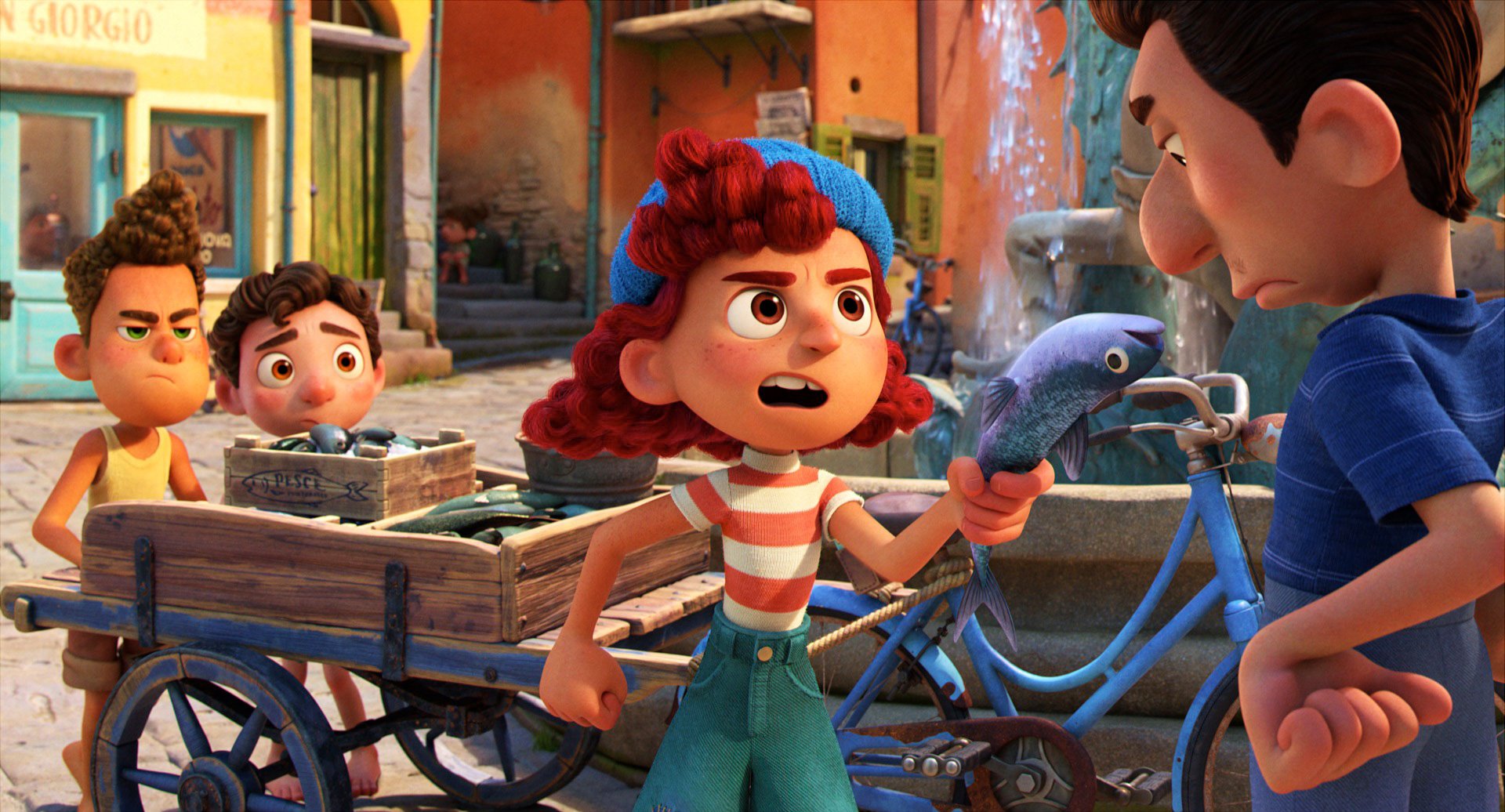
When Luca and Alberto daydream about their future with a legitimate Vespa, whimsical expressions of imagination take over. Casarosa sends them into the sky, where the stars are sardines and the moon a giant fish. Later, as Luca becomes interested in astronomy thanks to Giulia’s knowledge, he’s seen running on Saturn’s rings. These moments are brief but stirring in their sheer beauty, extra-vibrant colors, and surreal imagery, which is enhanced by Dan Romer’s rousing score. Cheerfully triumphant throughout, the music invites us on a grand adventure with its upbeat breeze of a melody.
Giulia is made into not a love interest but another friend of equal importance, and this decision maintains the innocent camaraderie that propels the story from the outset. Even when jealousy strikes Alberto, this seems to be a matter of sibling rivalry, not romance. Though Casarosa has clarified that the inspiration for the film was his platonic bond with a childhood bud, the subtext is open enough for others to interpret certain elements as a coming out from characters hiding their true selves to avoid prejudice and violence.
What makes Luca so deeply special is that, aside from cultural nods to Casarosa’s native Italy galore (visual and linguistic), the story zooms in on the bonds that boys can form before the yoke of traditional masculinity is imposed on them. Their sincere love for one another overlooks societal expectations. Through the deceivingly effortless playfulness of the story, Andrews and Jones show how betrayals at such an age feel catastrophic, how Luca seeks validation in Alberto, and in turn how that creates a follower-leader dynamic between them at first.
The arc of their friendship is disrupted when Giulia becomes an agent of change, putting their brotherhood into perspective and enriching it with her own desire for companionship. Eventually, the boys learn that though they’ve made each other better, perhaps their paths and goals won’t always be aligned. And that’s fine, because the tender-hearted affection they forged will outlive any changes but never outgrow them. Just like Luca and Alberto are one thing on land and another when submerged, Casarosa’s Luca is at once a bright ray of sunshine and a deep dive into fraternal connection.
“Luca” is released on Disney+ on Friday.
Cast: Jacob Tremblay, Jack Dylan Grazer, Emma Berman, Saverio Raimondo, Maya Rudolph, Marco Barricelli, Jim Gaffigan, Gino La Monica, Giacomo Gianniotti, Sandy Martin, Sacha Baron Cohen.
Directed by Enrico Casarosa
Produced by Andrea Warren
Executive-produced by Pete Docter, Peter Sohn, Kiri Hart
Story by Enrico Casarosa, Jesse Andrews
Screenplay by Jesse Andrews, Mike Jones
Music by Dan Romer
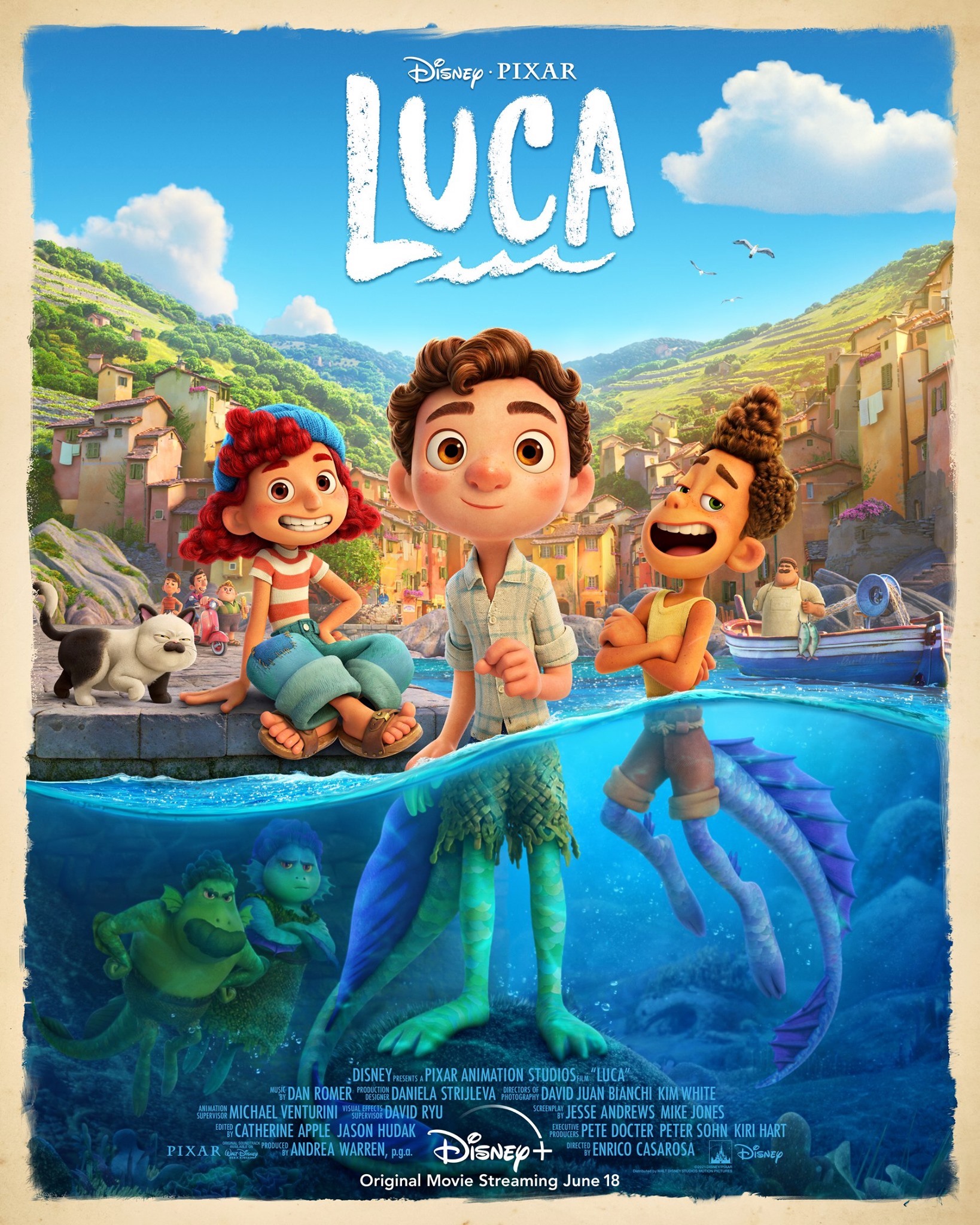

.png)

